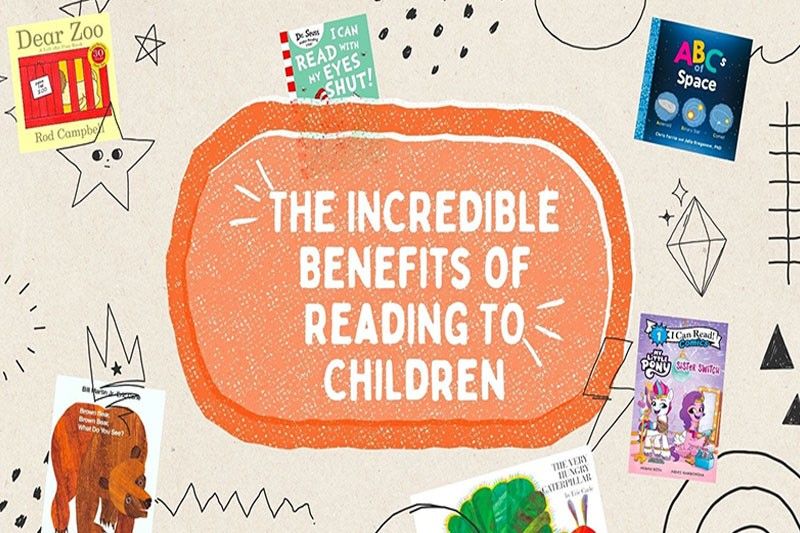Reading to kids: Benefits, book recommendations

MANILA, Philippines — With all the high-tech gadgets at their disposal these days, including laptops and tablets, plus all the computer games and movies they can access through the mobile phone, children hardly read anymore. Which is unfortunate for them.
Reading, after all, is one of the most incredible adventures that one can ever embark on. Books open doors to new worlds, provide entertainment, boost the imagination, and have positive neurological and psychological benefits on those who read them.
As Dr. Seuss, an American children’s book author and cartoonist whose real name is Theodor Seuss Geisel, puts it, “The more that you read, the more you will know; the more that you learn, the more places you will go.”
If reading is all that it is vaunted to be, then it means that one of the most valuable things parents can do for their children is to introduce them to the world of books by reading to them in the early years of their lives and instilling in them the love for reading.
Here, Fully Booked mentions some of the most incredible benefits that reading has in store for children:
- Reading helps boost brain development.
Did you know that in the first few years of a baby, more than a million new neural connections are formed every second? Yes, that is how fast a baby’s brain is growing and developing its architecture.
Recognizing this, pediatricians urge parents to read to their children every day. In the U.S., for example, the American Pediatrician Academy has issued a policy for its 62,000 member pediatricians to become powerful advocates for reading aloud, every time a baby visits a doctor.
Even though babies will probably spit up, cry, or babble in response, their brains are actually absorbing every word.
Book picks for boosting brain development are "The Very Hungry Caterpillar" by Eric Carle and "Hop on Pop" by Dr. Seuss.
- Reading improves vocabulary and language development.
Researchers estimate that babies who are read aloud to every day are exposed to around 78,000 words per year. This means that by the time they reach kindergarten, they would have accumulated around 1.4 million more words than children who are never read to. This piece of information is from a 2019 study, Journal of Development & Behavioral Pediatrics.
Therefore, reading to a child helps his or her blossoming language skills bloom. What’s more: By reading books, children are introduced to the language of books, which differs from the one used in normal conversation. Books tend to use grammatical and storytelling structures which can help kids improve not only their reading but also writing fluency.
Book picks for vocabulary and language development include "Brown Bear, Brown Bear, What Do You See?" by Eric Carle and "Dear Zoo: A Lift-the-Flap Book" by Rod Campbell.
- Reading helps with school success.
Every parent wants the best for their children, and this includes excelling in school. Note that this doesn’t necessarily mean getting straight As, but encouraging your kids to have a natural love for learning. Books help achieve this.
Megal Daley, teacher, librarian, and author of the book Raising Readers: How to Nurture a Child’s Love For Books, explains: “As a parent and educator, I know how beneficial it is for children to enter the education system bubbling with excitement about words, images, and ideas. Flash cards or early online reading programs won’t instill this joy in your little one, but gorgeous books will.”
When kids are brought up being read to, having story time with their parents, and provided a most imaginative play environment, they develop that love and natural thirst for knowledge. They know there’s plenty to learn, and books serve as gateways to that knowledge.
Daley concludes, “Immersing your child in the language of all forms – stories and songs and nursery rhymes - is one of the best ways you can give them a head start and help them reach their academic potential.”
Book picks for school success include "The ABCs of Space" by Chris Ferrie and Julie Kregenow, "Quantum Computing for Babies" by Chris Ferrie and Whurley, and "Baby’s First Eames: From Art Deco to Zaha" by Julie Merberg.
- Reading teaches children empathy.
Whether fiction or non-fiction, books are powerful tools in helping children imagine what it’s like to be in another person’s shoes. Books make it possible to explore inner lives of people across different backgrounds, or delve into other people’s perspectives in life.
Thus, books teach children empathy, and empathy, according to The Guardian, “is increasingly being recognized as a core life skill, and the bedrock for sound relationships and classroom climate.”
Books can also help children handle their feelings in a healthy way. Through reading and discussion with a parent or caregiver, a child learns that feelings of sadness, anger or frustration are completely normal, and teaches them the value of opening up and processing feelings.
Book picks for empathy are "Hello Genius" Series by Michael Dahl and "Berenstain Bears" Series by Sharon and Jan Berenstain.
- Reading prepares kids to read on their own.
Once your children find reading fun and rewarding, then you have successfully instilled in them a love of reading at an early age, and this unlocks that door to a lifelong passion and love for books. And as we all know, books are one of the most wonderful, yet simple joys of life.
Book picks for preparing kids to read independently include "My Little Pony Sister Switch (I Can Read Comics Level 1)" by Megan Roth and Agnes Garbowska, "I Can Read With My Eyes Shut!" by Dr. Seuss, and "Meet Mario! (Step into Reading)" by Malcolm Shealy.



















